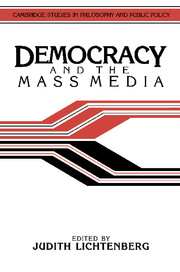Book contents
- Frontmatter
- Contents
- Preface
- List of contributors
- Introduction
- 1 Liberal constraints on private power?: reflections on the origins and rationale of access regulation
- 2 Liberalism and free speech
- 3 Foundations and limits of freedom of the press
- 4 Why the state?
- 5 Practices of toleration
- 6 Access in a post–social responsibility age
- 7 Who decides?
- 8 Four criticisms of press ethics
- 9 Political communication systems and democratic values
- 10 Mass communications policy: where we are and where we should be going
- 11 Content regulation reconsidered
- 12 The rationale of public regulation of the media
- 13 The role of a free press in strengthening democracy
- Index
5 - Practices of toleration
Published online by Cambridge University Press: 05 June 2012
- Frontmatter
- Contents
- Preface
- List of contributors
- Introduction
- 1 Liberal constraints on private power?: reflections on the origins and rationale of access regulation
- 2 Liberalism and free speech
- 3 Foundations and limits of freedom of the press
- 4 Why the state?
- 5 Practices of toleration
- 6 Access in a post–social responsibility age
- 7 Who decides?
- 8 Four criticisms of press ethics
- 9 Political communication systems and democratic values
- 10 Mass communications policy: where we are and where we should be going
- 11 Content regulation reconsidered
- 12 The rationale of public regulation of the media
- 13 The role of a free press in strengthening democracy
- Index
Summary
ORIENTATION
Ethical discussion of the media often centers on various freedoms, including freedom of expression, freedom of speech, freedom of the press, and freedom of information. These freedoms are seen as rights that protect speech, publication, and other sorts of representation from varied interferences. The grounds, the boundaries, and the implementation of these rights are controversial. Should the line between protected and unprotected speech be drawn at the same place for print and for broadcasting? What is that place? Can government interference with speech and publication be prevented without risking interferences by “private” powers? Can “private” powers be prevented from dominating the media except by government action? How, if at all, may or must these freedoms be curtailed for the sake of other objectives? Are these rights held only by individuals, or do they also belong to institutions, publishers, and editors? These questions are interesting, important, and unsettled.
Such topics are reached quite naturally if we begin by asking, How are we entitled to express ourselves? and if we worry that others may prevent us from doing so. Advocates of rights-based thinking see the First Amendment to the U.S. Constitution and John Stuart Mill's On Liberty as canonical texts and think interference with speech, publication, and other sorts of representation can only be justified when needed to protect other important rights.
At present rights-based thinking, whose central concern is the treatment to which people are entitled, is often taken as constitutive of deontological liberal thinking.
- Type
- Chapter
- Information
- Democracy and the Mass MediaA Collection of Essays, pp. 155 - 185Publisher: Cambridge University PressPrint publication year: 1990
- 7
- Cited by



